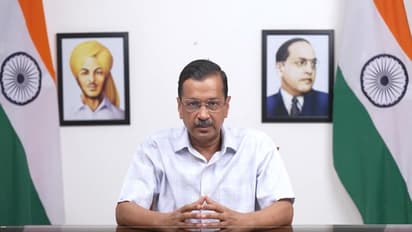After CBI arrest, Arvind Kejriwal complains of uneasiness in court due to low sugar level

Synopsis
The CBI moved the application for Kejriwal's arrest after he was produced before the court from Tihar Central Jail, where he is currently imprisoned in relation to the money laundering case being investigated by the Enforcement Directorate (ED).
Delhi Chief Minister Arvind Kejriwal was on Wednesday (June 26) arrested by the Central Bureau of Investigation (CBI) in connection with the alleged excise scam. The arrest followed an order from Special Judge Amitabh Rawat, permitting the CBI to formally take Kejriwal into custody. After his arrest, Kejriwal complained of uneasiness in court, citing low blood sugar levels.
The CBI moved the application for Kejriwal's arrest after he was produced before the court from Tihar Central Jail, where he is currently imprisoned in relation to the money laundering case being investigated by the Enforcement Directorate (ED).
'Confident you will allow us to speak': Rahul Gandhi welcomes Om Birla as Lok Sabha Speaker (WATCH)
Earlier in the day, the Supreme Court granted Kejriwal permission to withdraw his petition challenging the Delhi High Court's interim stay on his bail in the money laundering case linked to the alleged liquor policy scam.
Senior advocate AM Singhvi, representing Kejriwal, informed a vacation Bench of Justices Manoj Misra and SV Bhatti of their intention to file a fresh petition challenging the High Court's final order.
On June 20, Special Judge Niyay Bindu, acting as the vacation judge, granted bail to Kejriwal, noting that the ED had failed to provide direct evidence linking him to the proceeds of crime in the money laundering case.
Arvind Kejriwal hearing: Supreme Court allows Delhi CM to file fresh plea over HC's stay on bail
However, on June 21, the High Court put the bail order on hold, pending a decision on the stay. The High Court also issued a notice to Kejriwal, seeking his response to the ED's plea challenging the trial court's decision, and scheduled the hearing for July 10.
Stay updated with the Breaking News Today and Latest News from across India and around the world. Get real-time updates, in-depth analysis, and comprehensive coverage of India News, World News, Indian Defence News, Kerala News, and Karnataka News. From politics to current affairs, follow every major story as it unfolds. Get real-time updates from IMD on major cities weather forecasts, including Rain alerts, Cyclone warnings, and temperature trends. Download the Asianet News Official App from the Android Play Store and iPhone App Store for accurate and timely news updates anytime, anywhere.